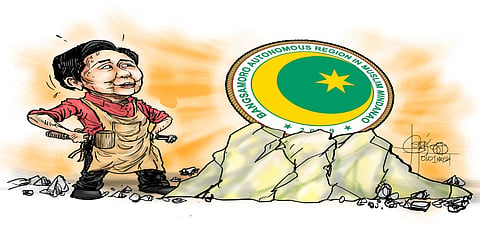
- NEWS
- the EDIT
- COMMENTARY
- BUSINESS
- LIFE
- SHOW
- ACTION
- GLOBAL GOALS
- SNAPS
- DYARYO TIRADA
- MORE

In warning those seeking to destabilize the Bangsamoro region, President Ferdinand Marcos Jr. wants to preserve the gains of the autonomy granted to a once restive part of the country.
Marcos was largely instrumental in the historic achievement of crafting the Basic Law of the Bangsamoro Autonomous Region (BLBAR), which was the Senate’s more equitable version of the Bangsamoro Basic Law (BBL) handed down from Malacañang.
PBBM warned those seeking to derail the Bangsamoro Autonomous Region in Muslim Mindanao (BARMM) parliamentary elections next year that they will pay the price since he would not allow it.
The elections are the culmination of the peace process that sought to end the Muslim rebellion that began during the term of PBBM’s late father in the 1970s.
In a determined voice, he warned plotters, “Don’t even think about it.”
Some so-called civil society groups are making noise about extending the life of the Bangsamoro Transition Authority (BTA) for another three years and deferring the elections until 2028, citing absurd suspicions.
In 2015, despite a Malacañang-imposed deadline, the Senate Committee on Local Government headed by then-Senator Bongbong Marcos stood its ground for a credible and lasting Bangsamoro law.
He defied the wishes of the Palace and generated suspicions of a partisan move against then-President Noynoy Aquino.
Marcos stood pat on making the law conform to the Constitution in defiance of the House move to approve a bill handed down by the Palace in toto.
Malacañang then shot back at the Marcos panel, saying Congress’s job was to create a law, not to determine its constitutionality.
The Palace’s stand was that the Supreme Court could later hear allegations of infirmity of the law.
At the time, Senate President Frank Drilon insisted deadlines were necessary because of the waypoints in the peace agreement with the Moro Islamic Liberation Front that needed to be followed.
Marcos insisted that some features of the law were similar to the Memorandum of Agreement on Ancestral Domain (MoA-AD) that the Supreme Court struck down as unconstitutional.
Both the BBL and the MoA-AD sought to create a Bangsamoro substate which is not allowed under the Constitution since it would, in effect, dismember the nation.
The MILF then warned Marcos it may not accede to the peace agreement if the Bangsamoro was not formed before Aquino stepped down from office, which meant a substate handed to them as Aquino promised.
Marcos did not budge, saying the bill that the Senate wanted to craft would be representative of the inhabitants of the Bangsamoro region who were MILF members as well as non-Muslim communities.
The BBL then was proving to be a divisive measure not only in Mindanao but the nation as a whole since it involved the possibility of treason over the carving up of the country’s patrimony, which under the BBL would be a substate as the MILF wanted.
The MILF insisted that the Bangsamoro territory would not be solely for its gain but for the entire Muslim minority in Mindanao.
The Marcos panel then proceeded to hear from the widest voices possible, even outside the Muslim community, and thus make the bill conform with the Constitution.
The Marcos panel’s final draft removed the opt-in provision for areas contiguous to the Bangsamoro.
Later, through the intercession of the Palace, the proviso was incorporated into the House version, which was renamed the BLBAR.
The contiguous areas were those mentioned in the Tripoli Agreement which consisted of 13 provinces — Basilan, Davao del Sur, Lanao del Norte, Lanao del Sur, Maguindanao, North Cotabato, South Cotabato, Sultan Kudarat, Sulu, Tawi-Tawi, Zamboanga del Norte, Zamboanga del Sur and Palawan — and nine cities.
These are the provinces the Bangsamoro may absorb through a vote of their residents.
Then-President Rodrigo Duterte succeeded in working for the signing of the Bangsamoro Organic Law, which was accepted by the majority of Filipinos and not only by a handful of interests.
The organic law was hewn from the measure drafted by the Marcos panel.
It is not ironic that the success of the entire peace process will see fruition under PBBM’s term since he helped in its birth.
